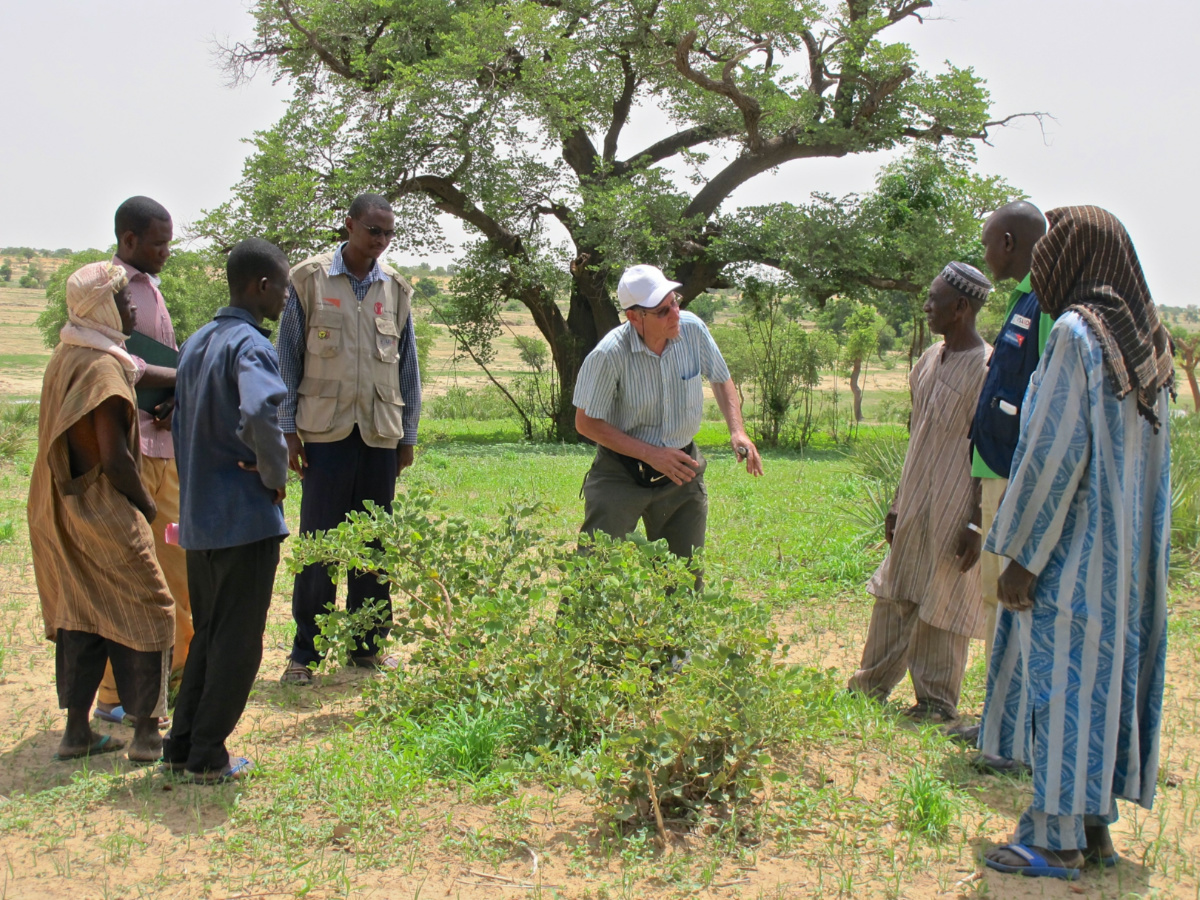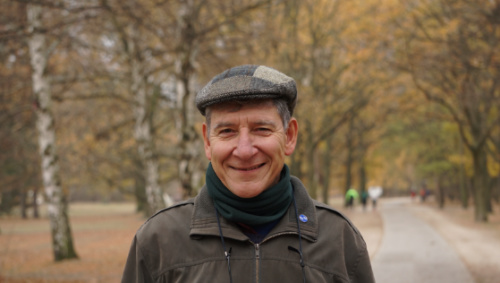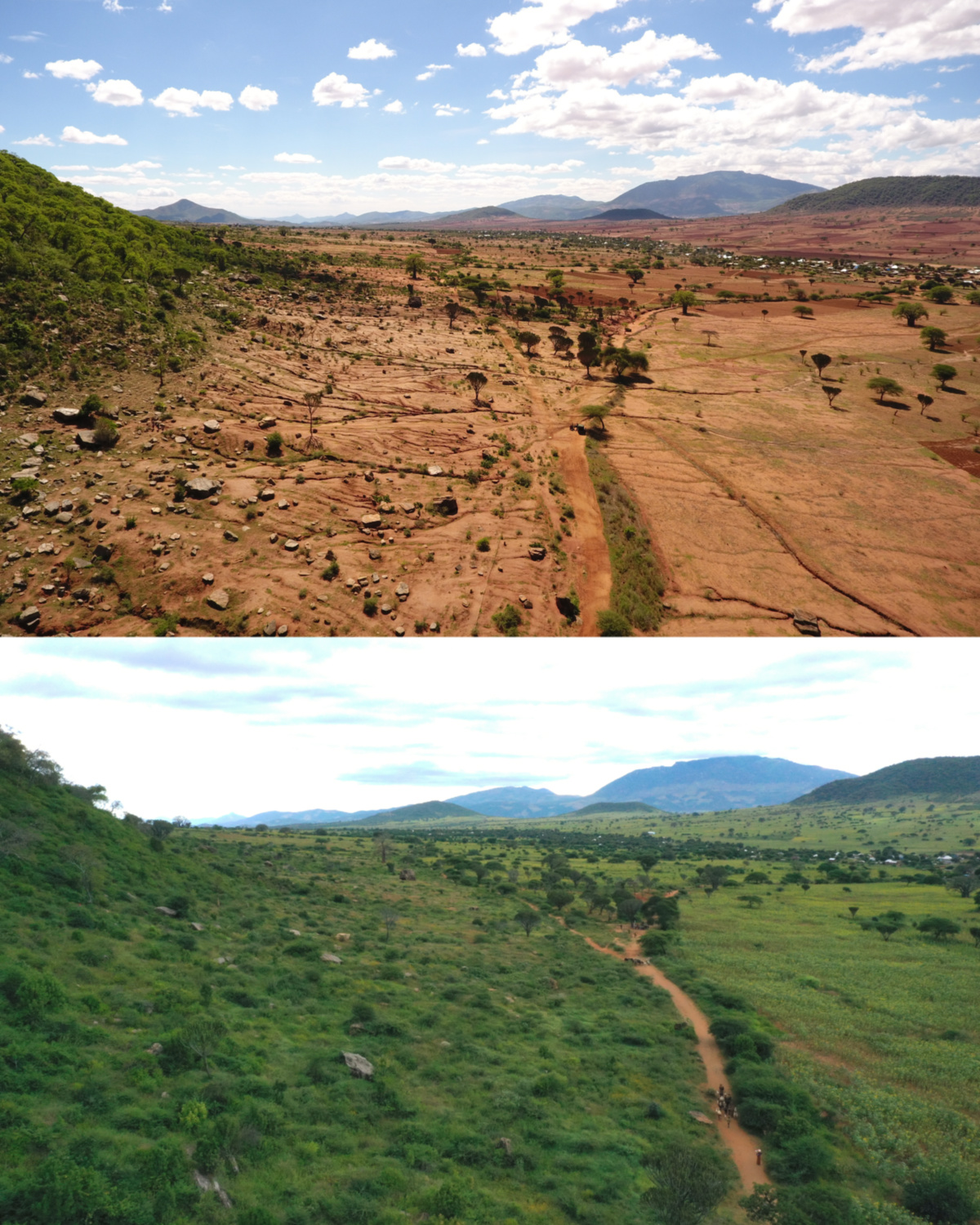Geelong, Australia
Australian agronomist Tony Rinaudo has a dream – to see trees regenerated on a billion hectares of degraded land within the next decade using a process known as Farmer Managed Natural Regeneration.
“On a human level, that’s crazy…” said Rinaudo, noting that it equates to three hectares per second for every second over the next decade. But the man known around the world as the “forest maker” hastens to add that his past experience – and his faith – lead him to believe it is achievable.

Tony Rinaudo instructs farmers in Niger in the techniques involved in Farmer Managed Natural Regeneration. PICTURE: Courtesy of World VIsion Australia
Farmer Managed Natural Regeneration – or FMNR as its known – involves reforestation without planting new trees but instead working with existing tree stumps and seeds lying dormant in the ground to encourage the growth of trees in degraded landscapes.

Tony Rinaudo in Berlin, Germany, 2018, where he received the Right Livelihood Award. PICTURE: Iris Manner
Not only does the technique, which is based on a traditional farming method, allow communities to reverse desertification and restore degraded land leading to higher crop yields but it also provides a range of other benefits including the provision of a more sustainable source of firewood.
Rinaudo, who is principal climate action advisor at World Vision Australia, said he first realised the potential for FMNR – back in the early Eighties.
“I’d been planting trees in Niger Republic – we arrived there in 1980 – so we’d been doing it [replanting trees] the hard way for that many years and then realised there’s all these tree stumps and seeds already in the ground,” he told Sight in an interview held in the lead-up to World Environment Day on Monday, 5th June.
It’s now estimated that six million hectares of agricultural land have been recovered drawing on FMNR techniques in Niger alone while worldwide the figure equates around 18 million hectares. About 15 million of that total are in West Africa.
We rely on our readers to fund Sight's work - become a financial supporter today!
For more information, head to our Subscriber's page.
In order reach a billion hectares by 2033, Rinaudo said World VIsion has started with four “catalytic” nations – Ethiopia, Kenya, Uganda and Zambia – which were selected because of their dry, semi-arid climate, the willingness of governments to get behind the project and the fact that each of the countries had been using the technique since at least 2012.
“In these four countries we really want to model how to replicate what happened in Niger,” Rinaudo said. “It became a movement – it wasn’t a project after a little while, it was just adopted by the farmers and they ran with it…So we’re trying, to the degree possible…to replicate those conditions and release this thing so it that takes on a life of its own.”
He said that’s possible “because the only thing it costs the farmer is labour”.
“The resources – everything they need, the tree stumps, the seed, they’re already in their land. So if you have the motivation, you can do it.”
World Vision doesn’t intend doing the task alone.
“Even with World Vision’s size, we won’t be able to do that alone,” noted Rinaudo. “So the idea is do it with and through others.”
Indeed, Rinaudo said a large part of his current role with World Vision now involves engaging with governments, policy-makers, donors, NGOs and faith-based groups.

Before and after images showing the impact of FMNR techniques in Luhundwa Tanzania between 2019 and 2022. PICTURE: Courtesy of the LEAD Foundation/World Vision Australia
Even so, Rinaudo – whose autobiography won Australian Christian Book of the Year last year and who has also garnered a number of other awards for his work – admitted the task ahead is somewhat daunting. But he said he takes courage from a number of factors including the significant impact the initiative could have on addressing climate change – Rinaudo says a billion hectares of new trees could see up to a quarter of carbon dioxide in the atmosphere drawn down as the trees grow – as well as on food security – in Niger alone, he pointed out, an additional 500,000 tonnes of grain has been produced annually as a result of the better soil and micro-climate created under the regenerated trees.
There’s also the ease with which FMNR can be rolled out – “you have everything at your feet”,” says Rinaudo, pointing to his experience in Niger where the technique spread across the country at the rate of around 250,000 hectares a year for 20 years without government intervention or external financial support.
“The heroes of the story were largely very poor, illiterate and risk-averse farmers. That encourages me because imagine if we got everybody on board – governments, donors, NGOs. Imagine what we could do on a global scale.”
The final reason for Rinaudo’s optimism stems from his Christian faith.
“In my experience, what looks impossible to man is possible with God. God answers prayer and I’m really hoping we can garner a lot of prayer support to meet this target…” he said.
“Humanly speaking, [a billion hectares] it’s an insane number – why pick such a number? But what I saw in Niger was an answer to prayer and I’d like to see that multiplied.”
To support World Vision’s FMNR initiative, head to https://www.worldvision.com.au/donate/fmnr






